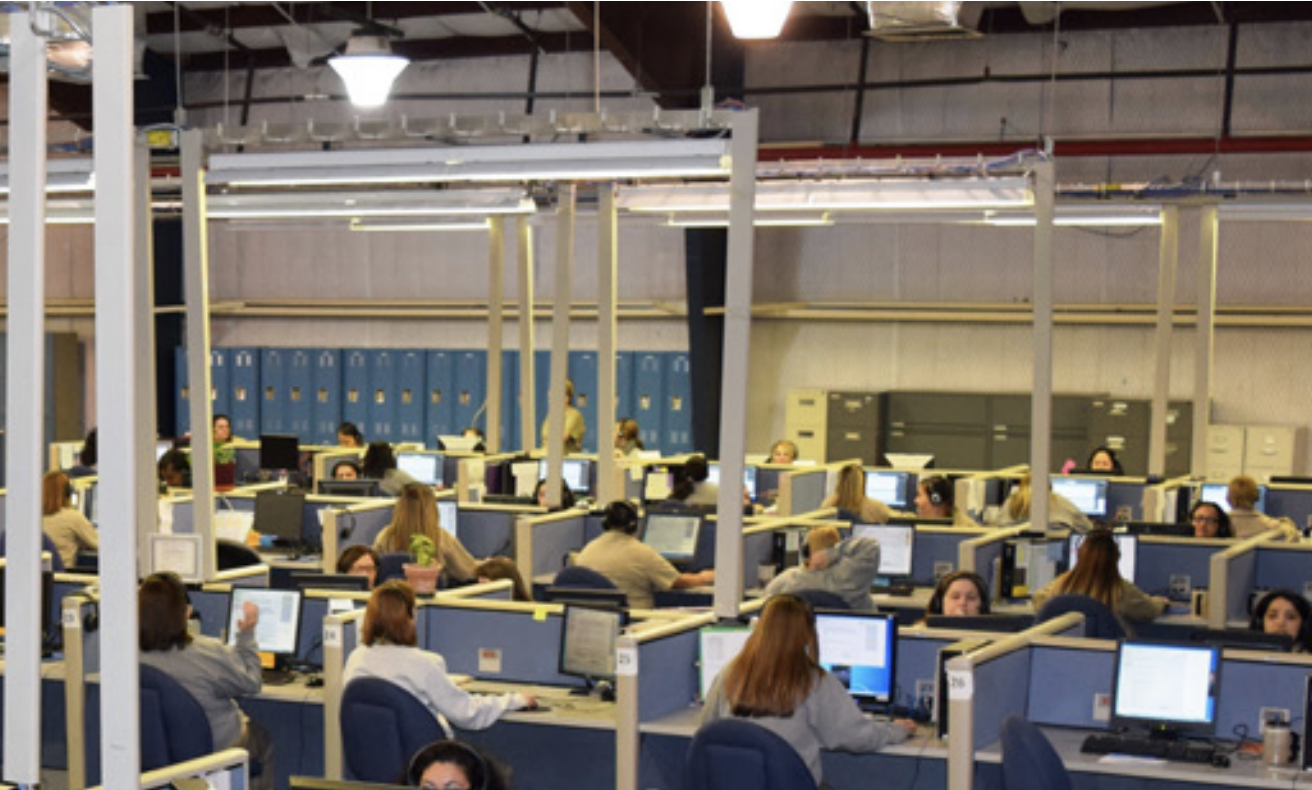Jobs
Prison Call Center Jobs Pay Minimum Wage, Which for Us Seems to Be $1.30

I work at prison call center. My job is to read from a script about various kinds of debt relief, to people who unwittingly gave out their phone number when they signed some Terms & Conditions contract they don’t remember. I’m calling them from a privately run men’s prison in the South, but obviously that’s not what the script says. I’m calling from Tax Relief Services, and it looks like they qualify for the IRS Fresh Start program. Have they heard of this program before?
The goal is to transfer them to a service representative for a “free debt relief consultation.” But only if they have the right kind of debt, so first we need to get them talking about whether there’s anything besides IRS back taxes they might need help with.
Credit card debt. Medical debt. Personal loans. State-level student loans. Mortgages. Repossessions. All of these are things we say we can potentially reduce or clear, but the vast majority of the people who pick up our calls are senior citizens who are retired and owe nothing to the IRS. Their education predates the student loan crisis. They’ve never taken out a mortgage. A lot of them have $10,000 or $20,000 in medical debt, but there’s nothing I can do for them.
The only people who actually get the consultation are those with IRS back taxes or credit card debt, which the service rep will be glad to help with for a modest fee. I can keep an elderly woman on the phone long enough for her to start crying and tell me about the $120,000 in unpaid hospital bills shows left with after her husband died, but when I transfer her the call will just be disconnected.
I don’t like this job. It’s demoralizing. I feel dirty about it. But I also have to eat, and the call center pays $1.30 an hour—more than double most jobs at this facility. There’s a bonus system wherein for each successful transfer of, say, credit card debt over $12,000, or tax debt over $20,000, we get $5. It would take three or four days to earn that at other jobs here.
We’re supposed to make minimum wage.
For obvious ethical reasons, there are restrictions on how products manufactured with prisoner labor can be sold, but there are ways around that.
Prison labor is often thought of in terms of making physical products, like license plates. Though making glorified telemarketing calls is less tangible, the call center is considered a job training program where we learn valuable marketing skills.
For obvious ethical reasons, there are restrictions on how products manufactured with prisoner labor can be sold. One way corrections departments can get around this is through the Private Sector/Prison Industry Enhancement Certification Program (PIECP).
The PIECP authorizes partnerships with private companies to produce cost-effective goods using prisoner labor. Those goods are then exempted from restrictions that would otherwise hamper profits. The justification is that we’re get real-world job experience, including making local minimum wage.
For starters, the PIECP allows up to 80 percent of our wages be deducted—to offset the rising cost burden of incarcerating us. But beyond that, once private contractors are involved there are infinite pathways to bring minimum wage down to $1.30 per hour.
Since the call center jobs arrived earlier in 2024, the company’s name has changed four or five times.
Some states have programs that allow private companies to use prisoner labor outside the PIECP entirely. The correctional industries program that runs our call center does pay local minimum wage for jobs at other facilities in the state, but at this one quietly pays less. You might want to ask how they are able to do that, but you can’t so long as there is no “they.”
The correctional industries program, for example, is separate from the department of corrections but still a state entity. It contracts with private entities such as the one I work for, which at time of publication at least appears to be Tax Relief Services. Since the call center jobs arrived earlier in 2024, the name has changed four or five times, always over the weekend. We come in Monday morning and find new paperwork that says we’re now calling from Credit Consolidation Services, or Hardship Debt Relief, or Consumer Alliance.
Some people here are under the impression they work for the company that runs the actual phone service—that’s Call Wizards. Meanwhile, call center jobs are proudly advertised as an opportunity for private companies to repatriate jobs that would otherwise go overseas.
“Imagine… All the benefits of domestic outsourcing at offshore prices,” Unicor, the federal correctional industries program, states on its website. “It’s the best kept secret in outsourcing!”
Photograph (cropped) via Unicor







:max_bytes(150000):strip_icc()/roundup-writereditor-loved-deals-tout-f5de51f85de145b2b1eb99cdb7b6cb84.jpg)


